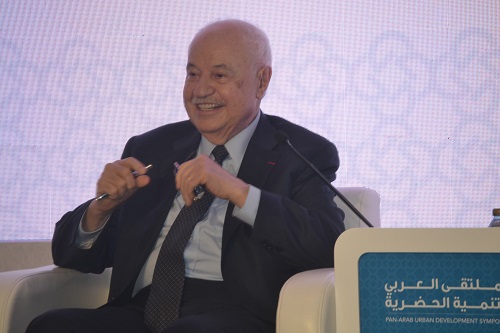Abu-Ghazaleh Foresees 2.5b People Added to Urban Areas by 2050
02-Apr-2019

Special to TAG Educa News Agency
At the 1st Pan-Arab Urban Development Symposium in Abu Dhabi
ABU DHABI- HE Dr. Talal Abu-Ghazaleh, Honorary Chair of the Consortium for Sustainable Urbanization (CSU) stated that 55% of the world’s population lives in urban areas, a proportion that is expected to increase to 68% by 2050.
During his keynote speech at the 1st Pan-Arab Urban Development Symposium (PAUDS) organized by Abu Dhabi Department of Urban Planning and Municipalities (DPM) in partnership with United Nations Human Settlements Program (UN-Habitat), Dr. Abu-Ghazaleh said that projections show that urbanization, combined with the overall growth of the world’s population could add another 2.5 billion people to urban areas by 2050.
"Our global population, 2.5 billion in the 1930s, is projected to reach 9 billion before 2050. Of the current 4 billion people living in cities a quarter, approximately 1 billion people, live in what are commonly known as informal settlements. And with number of people fleeing conflict, violence and disasters across the world never having been higher, the role of cities becomes increasingly important," he said.
"There is a recognition of the cross-cutting nature of urban issues, which have an impact on a number of other Sustainable Development Goals. Hence UN-Habitat’s complementary New Urban Agenda, as mentioned seeks to offer national and local guidelines on the growth and development of cities through 2036," Dr. Abu-Ghazaleh, member of the High-Level Advisory Board-UNDP (HLAB-UNDP) on Social Impact added.
More than 100 key decision makers, city authorities and leading urban experts tackled a forward-looking agenda to represent Arab cities at the 10th World Urban Forum (WUF10) in 2020.
The WUF10 will be convened by UN-Habitat and jointly organized with the Abu Dhabi Department of Urban Planning and Municipalities, along with partners including the Ministry of Foreign Affairs and International Cooperation, the General Secretariat of the Executive Council, the Abu Dhabi Police, Abu Dhabi Department of Culture and Tourism and the Abu Dhabi National Exhibition Centre.
The mission of the CSU, according to Dr. Abu-Ghazaleh, ranges from increasing awareness about emerging issues, facilitating knowledge transfer between and among policy and decision makers, fostering connections, cooperation, and collaboration between and among the world of design and the world at large while promoting the UN Habitat 17 Sustainable Development Goals (SDGs), and the New Urban Agenda adopted at the 2016 Habitat III meeting in Quito, and agenda 2030.
"The CSU is working hard engineering many successful programs and participating in critical discussions in South America, Europe and Asia but still there are many things that need to be discussed, tackled and implemented starting with designing new cities and the redesigning of existing cities addressing the existential threat of global warming, a real threat to our existence," he said.
Dr. Abu-Ghazaleh pointed out that it is predicted that there will be a human crisis in 2032 due to global warming calling on France who hosted the Paris Agreement on Climate Change conference to lead the rescue campaign. Dr. Abu-Ghazaleh believes that forming an AI team of experts would be more efficient than the government team in the UN.
Dr. Abu-Ghazaleh, a UN-HABITAT partner stressed on the need to make lives better more quickly using accelerator programs, leap from technologies that would produce sustainable building without increasing carbon emissions and new infrastructure that would reduce and reuse water, purify precious water, and be fast to build and less disruptive.